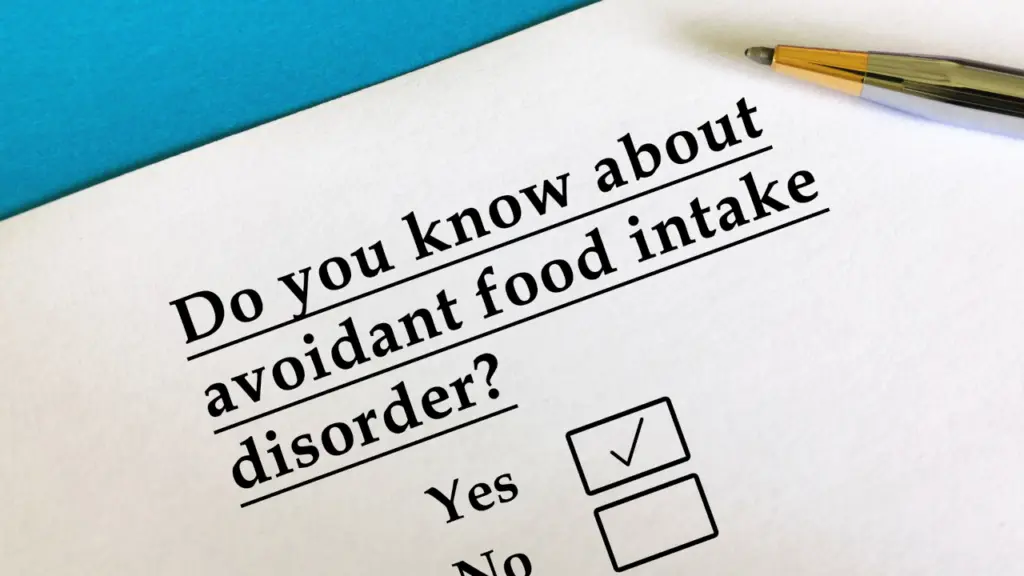ARFID, or avoidant/restrictive food intake disorder, is an eating disorder characterized by the voluntary limiting of food intake that is not related to distorted body image concerns, but instead to anxieties about food itself.
In 2013, ARFID diagnosis criteria was added to the Diagnostic and Statistical Manual of Mental Disorders, Fifth Edition (DSM-5), a clinician’s handbook published by the American Psychological Association that provides standardized classifications of mental health conditions.
While there is at this time limited research on the prevalence of ARFID, a 2022 study in The Journal of Eating Disorders reported that between 0.5% and 5% of children and adults in the United States have this disorder. Though ARFID most often first appears during childhood, it can develop at any age. Childhood ARFID sometimes persists into adulthood.
People with ARFID restrict their food intake because of anxiety surrounding the consumption of certain foods. They may have fears of choking or vomiting, or they may strongly dislike foods that have a certain taste, color, texture, or smell. A traumatic experience, such as force-feeding or a prior instance of choking, may lead to ARFID.

Some underlying neurological conditions, including autism, have been linked to the disorder. A person may be predisposed to ARFID if there is a history of eating disorders in their family.
Unlike the eating disorder anorexia nervosa, persons with ARFID don’t experience a distorted body-image or a desire to lose weight through severe calorie restriction.
Although ARFID is sometimes called “selective eating disorder,” it is not the same as being a picky eater. Picky eaters are usually young children who resist only a few, selected foods items, and being a picky eater doesn’t affect the child’s appetite or growth. Picky eating during childhood tends to go away on its own as the child grows into adolescence.
But ARFID can persist into adulthood and sometimes may not go away without treatment.
ARFID can have dangerous complications if a person is unable to consume sufficient nutrients to maintain their health. Treatment for ARFID often involves cognitive behavioral therapy. Sometimes gastroenterology treatment to address GI discomfort or medication to reduce anxiety and fears about food intake are used as well.
Symptoms of ARFID
ARFID symptoms impact the physical, psychological, and behavioral aspects of a person’s life. These include:
Physical symptoms
- Significant weight loss
- Lack of growth in children
- Impaired immune function
- Muscle weakness
- Low body temperature
- Abdominal pain/stomach cramps
- Constipation
- Irregular menstrual cycles
- Cold intolerance
- Lethargy
- Dizziness
- Thinning of body hair
Psychological symptoms
- Loss of interest in eating
- Feelings of anxiousness about the consequences of eating, such as choking or vomiting
- Vague gastrointestinal complaints or upset stomach around mealtimes
- Difficulty concentrating
Behavioral symptoms
- Picky, selective eating habits
- Avoidance of foods that have an unwanted taste, color, texture, or smell
- Avoidance of social activities that may involve eating.
FAQs
While children usually grow out of picky eating, sometimes ARFID lasts into adulthood. Adults with ARFID are more likely to require medical intervention or hospitalization for the condition. ARFID in adults can cause nutritional deficiencies and gastrointestinal issues as well as psychosocial issues.
In adults, ARFID symptoms are often related to avoidance behaviors affiliated with sensory characteristics such as the taste, color, texture, or smell of foods. Sometimes, even the appearance or temperature of food is off-putting to an adult who has avoidant/restrictive food intake disorder.
Weight loss in adult ARFID patients is not related to body image distortion, as is the case in patients with anorexia or bulimia.
ARFID in children is more than the typical “picky eating” behaviors that many children exhibit. ARFID puts children at risk of nutritional deficiencies and physical, mental, and behavioral health problems associated with the disorder.
Signs of avoidant restrictive food intake disorder in children may include:
- Fears or resistance to new or unfamiliar foods
- Fears or negative reactions to certain smells, textures, tastes, or colors of food
- Overall lack of interest in food and often being “not hungry”
- Fears of adverse consequences of eating, such as choking or vomiting
- Food avoidance behaviors such as complaining of stomach pain, having a temper tantrum, or refusing to eat
Restricted eating in children can result in failure to reach normal weight goals for the child’s age or meet nutritional needs. It can also affect social development and possibly delay puberty.
According to the National Eating Disorders Association, a diagnosis of avoidant/restrictive food intake disorder is made when restricted food intake leads to excessive weight loss with possible nutritional deficiencies, when food supplements or tube feeding are required, or when restricted food intake interferes with social and interpersonal relationships.
Food limitation associated with the following do not meet the criteria for ARFID diagnosis:
- Limited food intake due to food insecurity, religious fasting, or the presence of an additional medical condition
- Limited food intake due to a distorted body image or a desire to minimize body size and shape
- Limited food intake that results from a medical condition that does not exceed expected amounts of weight loss or cause a major complication to the overall health of the patient
A diagnosis of ARFID often involves a physical exam and blood or urine tests to determine a patient’s general health, possible nutritional deficiencies, and possible organ dysfunction.
ARFID includes some similarities to autism spectrum disorder. A 2023 study
reported in Current Opinion in Psychiatry found “a considerable overlap between ARFID and autism,” with 8% to 55% of children diagnosed with ARFID also having characteristics of autistic spectrum disorder.
Impact and Complications of ARFID
The consequences of ARFID can be severe. Consistently eating a highly selective, restrictive diet that avoids multiple foods or categories of food, such as fruits, vegetables, or meats, may result in deficiencies of key nutrients and lead to negative physical outcomes.
ARFID can also affect a person’s socialization opportunities. People with ARFID may avoid family dinners or avoid participating in other activities that involve food. Relationships, as well as work or school responsibilities, may suffer.
Serious complications arising from ARFID may include:
Finding ARFID Treatment Today
Treatments for ARFID may include psychoeducation about nutrition and food safety, exposure therapy (gradually introducing new foods), anxiety management, and reward-based contingency interventions (giving praise or small rewards for bites of food eaten).
Currently there are no medications approved by the FDA for the condition, but medications that address anxiety symptoms are often used in ARFID treatment. Medications to increase appetite are also sometimes used.
Psychological treatment may include:
Cognitive Behavioral Therapy
Cognitive behavioral therapy focuses on the beliefs, values, and thinking processes that maintain ARFID behaviors.
Family Therapy
Family therapy supports patients and helps them overcome lack of interest in food and eating, and fears of negative consequences. For instance, family members can emphasize the social interaction and bonding aspects of mealtime and reassure patients that others will be able to intervene if the patient experiences choking.
Sources for Professional Treatment
If you need professional treatment, you have a wide range of options, including:
Inpatient behavioral health treatment may be required if serious medical complications such as cardiac or gastrointestinal issues are present. Inpatient treatment offers 24/7 supervision with both medical and psychological clinicians providing care in a supportive, safe environment.
Outpatient behavioral health treatment provides treatment in daytime hours without overnight stays. Programs include partial hospitalization, or day programs, typically providing 4-8 hours of treatment per day over 5 days a week.
Treatment involves individual and group therapy, skills training, and medication management if needed. Intensive outpatient programs typically provide 9-20 hours per week of similar treatment. Regular outpatient programs may meet once or twice a week and offer individual, group, or family counseling and educational workshops.
Telehealth behavioral health treatment is available using online video conferencing or telephone sessions for people who cannot or prefer not to attend a program in person. You can find behavioral treatment programs near you by asking for a referral from your primary doctor, a nutritionist, or your insurance provider.
No matter which program you choose, access help as soon as possible to avoid serious consequences. Early intervention is important for achieving the best outcomes for ARFID treatment.
Addiction Centers Nearby Treating Eating Disorders
Finding facilities near you…





